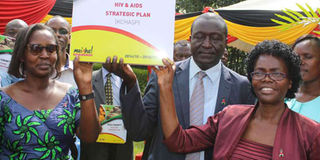Now experts concerned about cut in HIV funding

Ms Regina Ombam (left), deputy director, HIV Investments at the National AIDS Control Council and Ms Sarah Omache, Kisii health executive committee member, unveil the county's HIV/AIDS strategic plan on August 16, 2016. Global funding for HIV/AIDS is reducing. PHOTO | BENSON MOMANYI | NATION MEDIA GROUP
What you need to know:
- It is also estimated that the budget reduction by US could lead to nearly 200,000 new HIV infections.
- Around 76 per cent of pregnant women living with HIV had access to antiretroviral medicines.
PARIS
More than $26.2 billion (Sh2.7 trillion) will be required to fight HIV/Aids by 2020 in low and middle income countries, a report has said.
But this, experts say, might not be achieved as most donors have withdrawn their funding to most global health projects.
“We have done a tremendously good job for the last 30 years but I am afraid that we are heading to the dark corners since we will not be able to help our people who need our services,” Prof Linda Gail Bekker, the president of the International Aids Society, said.
ARV THERAPY
According to the report released Sunday by the Joint United Nations Programme on HIV/Aids during the 9th International Aids Society Conference in Paris, France, 19.5 million people living with HIV are accessing antiretroviral therapy, up from 17.1 million in 2015 and 7.7 million in 2010.
It also revealed that in 2016, around 53 per cent of all people living with HIV had access to treatment.
FUNDING
Around 76 per cent of pregnant women living with HIV had access to antiretroviral medicines to prevent transmission of HIV to their babies.
“These strides can only be made when funds are available to do basic science and research," Prof Bekker said.
The report titled Statistics on the Status of the Aids Epidemic also indicated that at the end of 2016, $19.1 billion was available for the AIDS Response in low- and middle-income countries.
“Domestic resources constituted 57 per cent of the total resources for HIV in low- and middle-income countries in 2016," the report said.
AFRICA
Experts and campaigners on Sunday warned that if nothing is done to bridge the gap that is being left by the donors, more than 830,000 people, mostly in Africa, are going to be deprived of anti-retroviral drugs.
Figures by the Kaiser Family Foundation, a California-based health policy NGO, also estimated that the reduction of budget by US president Donald Trump could lead to nearly 200,000 new HIV infections.
“We are meeting our funders —France and US — to look at the best way of handling the epidemic.
"The conference returns to Paris. It’s here and in the US that the HIV virus was discovered.
"The two countries have been globally funding leaders on the research and science for HIV response,” Prof Bekker said.
PROBLEMS
“Yet today we are seeing the countries’ leadership take very different stances on prioritising future investment into HIV science. Where are we headed?” she asked.
Prof Jean-Francois Delfraissy, one of the researchers who discovered the virus, said the struggle to get the HIV vaccine was already halfway but with the decline in funding, researchers are already facing more problems.





